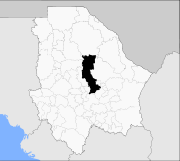Chihuahua, Chihuahua
| City of Chihuahua | |||
|---|---|---|---|
| City | |||

Chihuahua City in mid-May 2005
|
|||
|
|||
| Motto: Valentía, Lealtad, Hospitalidad (Translated to Courage, Loyalty, Hospitality) | |||
 Location in the state of Chihuahua |
|||
| Coordinates: 28°38′07″N 106°05′20″W / 28.63528°N 106.08889°WCoordinates: 28°38′07″N 106°05′20″W / 28.63528°N 106.08889°W | |||
| Country | Mexico | ||
| State | Chihuahua | ||
| Municipality | Chihuahua | ||
| Government | |||
| • Alcalde | Javier Garfio Pacheco (PRI) | ||
| Elevation | 1,415 m (4,635 ft) | ||
| Population (2013) | |||
| • Total | 925,970 | ||
| • Demonym | Chihuahuense | ||
| Time zone | MST (UTC−7) | ||
| • Summer (DST) | MDT (UTC−6) | ||
| ZIP codes | 31000 | ||
| Area code(s) | +52 614 | ||
| Climate | BSh | ||
| Website | / City of Chihuahua | ||
The city of Chihuahua (Spanish pronunciation: [tʃiˈwawa]) is the state capital of the Mexican state of Chihuahua. It has a population of about 925,970. The predominant activity is industry, including domestic heavy, light industries, consumer goods production, and to a smaller extent maquiladoras.
It has been said that the name derives from the Nahuatl language, meaning "between two waters", other accepted definitions are "place of the holed-rock" " or from Tarahumara, "dry and sandy place". The name itself is older than the Spanish conquest of Mexico. The city was founded on October 12, 1709, by Blas Cano de los Rios and Antonio Deza y Ulloa, a Spanish explorer, as El Real de Minas de San Francisco de Cuéllar. Don Ildefonso de Irigoyen donated the land for the city foundation. The town was erected a Villa in 1718 (or 1715) with the name of San Felipe el Real de Chihuahua, and the name was shortened in 1823. The location was chosen because it is the intersection of the rivers Chuviscar and Sacramento. It is also the midpoint between the Río Bravo del Norte (Rio Grande) and the then-important mining city of Hidalgo del Parral. For much of the 18th century, Chihuahua served as the de facto capital of Nueva Vizcaya because most governors preferred to reside there rather than in Durango, the capital of the province at that time.
Just as in other parts of Northern Mexico, Roman Catholic missionaries were an important influence during the colonial era, and the city became a meeting point for missionaries heading to and from the 'sierra', the mountainous region in western Chihuahua State where the native Tarahumara still live.
...
Wikipedia


